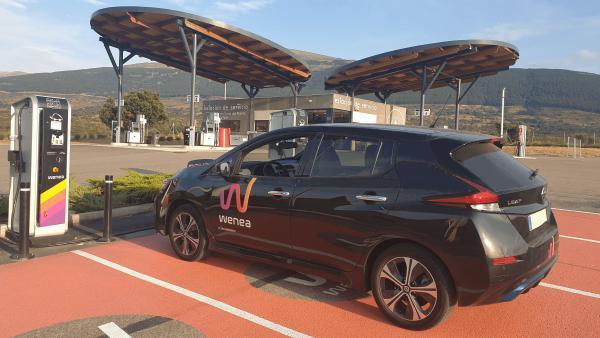
EIB invests €50 million in Wenea to deploy over 470 charging stations for electric vehicles in Spain
- The fast and ultra-fast charging stations will be located along Spanish motorways, including those of the Trans-European Transport Network (TEN-T).
- The EIB financing of €50 million will enable the company to carry out an investment of around €100 million to increase long distance mobility in Spain.
- The project will contribute to reducing CO2 emissions by 31 000 tonnes a year.
- The project is financed under the Future Mobility product, backed by the Connecting Europe Facility (CEF) and the NER300 Programme of the European Commission.
The European Investment Bank (EIB) and Wenea, via Nordian CPO, a company owned by Diggia Group that provides services for electric vehicles, are joining forces to strengthen long-distance and interurban electric mobility in Spain. The EU bank will provide €50 million to Wenea via Nordian CPO, enabling the Spanish company to carry out an investment of around €100 million to increase long distance mobility in Spain.
Concretely, thanks to the EIB support, Wenea will deploy over 470 fast and ultra-fast charging stations for electric vehicles across the country by the end of 2022. The EIB financing is supported under the Future Mobility facility (FM, backed by the Connecting Europe Facility and the NER300 Programme of the European Commission).
The charging infrastructure being deployed consists of over 470 charging stations with Kilowatt (kW) power of between 50kW and 150kW, enabling vehicles to charge between 60% and 80% of their battery in 20 minutes. The majority of the charging stations will be located along Spanish motorways and major roads, including those of the Trans-European Transport Network (TEN-T). An estimated 25% of these will be deployed in less populated areas of Spain (cohesion regions) to offer complete coverage to electric vehicles’ drivers.
The EIB financing contributes to the implementation of the Spanish National Integrated Energy and Climate Plan 2021-2030 (PNIEC), which sets the ambitious target of having five million electric cars and light-duty vehicles on the market by 2030, as well as to supporting future European and national decarbonisation plans.
The deployment of these charging points will bring major environmental benefits while boosting job creation in Spain. According to the EIB’s estimates, the implementation of the project will contribute to reducing CO2 emissions by 31 000 tonnes per year and around 150 people will be contracted to deploy more than 470 charging stations across the country.
EIB Vice-President Ricardo Mourinho Félix, who is responsible for the Bank's operations in Spain, said: “Transport is the second-largest source of global greenhouse gas emissions and, therefore, the decarbonisation of this sector is key to achieving climate neutrality by 2050. A lack of EV charging points is one of the major deterrents to the adoption of electric vehicles. This is why, as the EU climate bank, we are delighted to back Wenea in this endeavour that will strengthen long-distance clean mobility and boost job creation in Spain, contributing to a sustainable and inclusive revival of the Spanish economy.”
Adina Vălean, European Commissioner for Transport, added: “This loan will support our European Green Deal and Sustainable and Smart Mobility Strategy objective of deploying one million alternative fuel charging points by 2025. To accelerate the transition towards smart and sustainable transport, we need the alternative fuel market to reach scale, and I am happy that we are able to support Project Everest’s contribution towards this.”
José Manuel Zorrilla, CEO of Diggia Group, said: “The EIB's support enables us to make a qualitative step forward with Wenea, providing coverage to charge EVs and thus ensuring excellence as an independent player focused on our passion – serving electric vehicle clients, who contribute to sustainability of the planet by reducing CO2 emissions. We expect this operation with the EIB to be the first of many deployments that we intend to undertake in the European Union.”
Background information:
Connecting Europe Facility
The Connecting Europe Facility (CEF) is an EU funding instrument to promote growth, jobs and competitiveness through targeted infrastructure investment at European level.
NER300 programme
NER300 aims at co-financing demonstration projects for environmentally safe carbon capture and storage (CCS) and innovative renewable energy (RES) technologies on a commercial scale. It is funded from the sale of 300 million allowances from the new entrants' reserve (NER) of the EU ETS (European Union Emissions Trading System). Further NER300 calls for proposals are not planned and the undisbursed funds are reinvested through existing EU financial instruments managed by the European Investment Bank: InnovFin Energy Demo Projects (EDP) and the Connecting Europe Facility (CEF) Debt Instrument.
The Future Mobility facility is a joint initiative of the European Commission and the EIB established under the Connecting Europe Facility (CEF) Debt Instrument, which aims to support Europe’s decarbonisation agenda, with an emphasis on cleaner, safer and smarter transport solutions. The Future Mobility facility can be partially funded by the NER300 programme established by the European Union.
About Diggia Group
Diggia Group is a sustainable innovation company whose mission is to become one of the 100 worldwide companies that contribute to CO2 reduction.
Diggia’s main activities are divided into four business units:
- Gamma Solutions: 5G to Green
- SferaOne: Renewables and Energy Efficiency
- Wenea: EV Services provided via Nordian CPO (Wenea Spain Infrastructure)
- Gamma Health: Health to zero emissions
This ambitious deployment for long-distance mobility in Spain places Wenea as a leading operator in the country for fast and ultra-fast recharging.